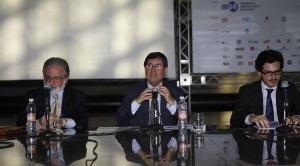Law of Access to Information goes slowly, points out research

In December, at the Memorial da América Latina, in São Paulo, the Seminar “Transparency and Control of Corruption - The Law on Access to Information” brought together representatives of civil society and public bodies that seek to eradicate the corruption of Brazilian social culture. Divided into two panels, the event promoted a discussion on the role of the government and civil institutions in fighting corruption.
More than 200 people attended the opening of the seminar promoted by the Movement of the Democratic Public Ministry (MPD). The morning was dedicated to discussions on transparency and the control of corruption by the State, with emphasis on the presentation by the Chief Minister of the Comptroller General of the Union, Jorge Hage, and for the presentation and analysis of the results of the research on implementation. of the Access Law in the Public Ministry of Brazil, made by Fabiano Angélico, of the Getúlio Vargas Foundation.
Based on questionnaires sent to 30 units of the Federal Public Ministry, Labor and Military, in addition to the 27 state MPs, the survey found that, with almost six months in force, the public ministries are not yet fully prepared to implement the new rules necessary for the effective implementation of the Access to Information Law. Among the problems encountered are the employees' lack of knowledge about the legislation and the lack of a specific sector to fulfill requests.
According to Angélico, “no public prosecutor has fully implemented the law. There are some more advanced ones, but all are at an early or intermediate stage. ”
Law No. 12.527 / 11 provides mechanisms for the citizen to have quick and easy access to public information. Among its objectives is the development of a culture of transparency and social control in public administration. That is, to spread the thought that every citizen has the right to know what the State does and to demand attitudes, if something is wrong.
In the second panel of the seminar, in the afternoon, the participation of civil society was discussed. The panel "Control of Transparency by Society" was attended by the chief executive of ETCO, Roberto Abdenur. In his lecture, he spoke about the important role of civil society organizations in fighting corruption and presented conclusions from the international seminar “The Impact of Corruption on Development”, held by the institute in August, in a partnership with the newspaper Valor Econômico.
The event also had important speakers, such as Dimas Ramalho, advisor to the State Court of Auditors (TCE); Tais Ferraz, advisor to the National Council for the Public Prosecution (CNMP); Wellington Saraiva, of the National Council of Justice (CNJ); Ela de Castilho, Deputy Attorney General and MPF Ombudsman; and Professor Eugênio Bucci, from the School of Communications and Arts at the University of São Paulo (ECA / USP).



